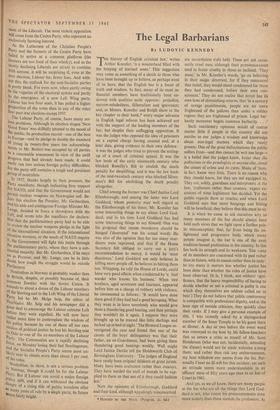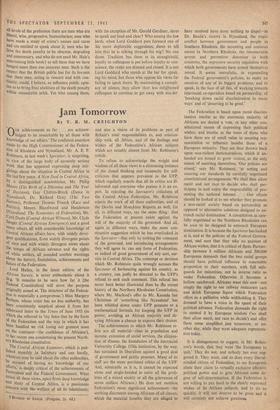The Legal Barbarians
By LUDOV1C KENNEDY
‘rr91-1E history of English criminal law,' writes I Arthur Koestler, 'is a wonderland filled with the braying of learned asses.' This suggestion may come as something of a shock to those who have been brought up to believe, as perhaps most of us have, that the English bar is a fount of truth and wisdom. In fact, many of its most in- fluential members have traditionally been en- dowed with qualities quite opposite : prejudice, narrow-mindedness, illiberalism and ignorance; and, as Messrs. Koestler and Rolph show in the key chapter to their book,* every major advance in English legal reform has been achieved not with the support of the leading members of the bar, but despite their unflagging opposition. It was the judges who opposed the idea of prisoners on a capital charge having counsel and, at a later date, giving evidence in their own defence: it was the judges who tried to prevent the setting- up of a court of criminal appeal. It was the law lords of the early nineteenth century who blocked Romilly's Bill to abolish the death penalty for shoplifting; and it was the law lords of the mid-twentieth century who blocked Silver- man's Bill for abolishing the death penalty altogether.
Chief among the former was Chief Justice Lord Ellenborough; and among the latter was Lord Goddard, whom posterity may well regard as the Ellenborough of his times. Mr. Koestler has some interesting things to say about Lord God- dard, and in his time Lord Goddard has had some interesting things to say himself. One was his proposal that insane murderers should be hanged ('destroyed' was his actual word). He was also of the opinion that far too many mur- derers were reprieved, and that if the Home Secretary felt obliged to carry out a jury's recommendation to mercy, it would be 'most disastrous.' Lord Goddard not only believes in killing more people off, he believes in hitting them too. Whipping, he told the House of Lords, could have very good effects when conducted by 'a hief warder who knows his business.' When two brothers, aged seventeen and fourteen, appeared before him on a charge of robbery with violence, he commented as follows : 'It would have done them good if they had had a good larruping. What they want is to have somebody who would give them a thundering good beating, and then perhaps they wouldn't do it again. I suppose they were brought up to be treated like little darlings and tucked up in bed at night.' The Howard League in- vestigated the case and found that one of the causes of the boys' delinquency was that their father, an ex-Guardsman, had been giving them thundering good beatings weekly. Well might Lord Justice Devlin tell the Holdsworth Club of Birmingham University : 'The judges of England have rarely been original thinkers or great jurists. Many have been craftsmen rather than creators. They have needed the stuff of morals to be sup- plied to them so that out of it they could fashion law.'
Now the opinions of Ellenborough, Goddard and their kind, although appallingly misconceived * HANGED BY THE Ni u. K. (Penguin. 2s. 6d.) are nevertheless truly held. These are not neces- sarily cruel men, although their pronouncements tend to foster cruelty in those so inclined. 'They must,' in Mr. Koestler's words, 'go on believing in their magic deterrent, for if they renounced that belief, they would stand condemned for those they had condemned, before their own con- sciences.' They do not realise that terror has its own laws of diminishing returns, that 'in a century of savage punishments, people are no more frightened of the gallows than under a milder regime they are frightened of prison. Legal bar . barity moreover begets common barbarity. . .
Such reactionary opinions would of course matter little if people in 'this country did not ascribe to our judges a wisdom and knowledge about non-legal matters which they rarely possess. One of the great hallucinations the public suffers from—and this cannot be writ too large— is a belief that the judges know, better than the politicians or the penologists or anyone else, about the causes of crime and its cures. Many of them. in fact, know very little. There is no reason why they should know, for they are not equipped to. They are, solely, guardians and interpreters af tlze, taw, 'craftsmen rather than creators, expert ex- ecutors of what legislature has decided. Yet the public regards them as oracles, and when Lord Goddard says that more hangings and hitting will be beneficial, they believe that this must be so.
It is when we come to ask ourselves why so many members of the bar should always have held such views that we light upon a further pub- lic misconception; that, far from being the en- lightened and progressive body which many people imagine it, the bar is one of the most tradition-bound professions in the country. In this lies both its strength and its weakness. Too rt-,any of its members are concerned with its past rather than its future, with its means rather than its ends: to too many it matters less whether justice has been done than whether the rules of justice have been observed. (It is, I think, not without signi- ficance, that the heavy responsibility of having to decide whether or not a criminal is guilty is one which they themselves are seldom called on to bear.) They do not believe that public controversy is compatible with professional dignity, and at the least sign of outside criticism, they quickly close their ranks. If I may give a personal example of this, I was recently asked by a distinguished member of the Inner Temple to be his guest there at dinner. A day or two before the event word was conveyed to my host by his fellow-benchers that so severe a critic as myself of Mr. Scott Henderson (who was, not, incidentally, attending the dinner) would not be made welcome among them; and rather than risk any embarrassment, my host withdrew our names from the list. Per- sonally I bear no for this incident; yet such. an attitude seems more understandable in an officers' mess of fifty years ago than in an Inn of Court in 1961.
And yet, as we all know, there are many people at the bar who are all the things that Lord God- dard is not, who resent his pronouncements even more acutely than those outside the profession. At all levels of the profession there are men who are liberal, wise, progressive, humanitarian; men who have made a study of crime's causes and cures and are entitled to speak about it; men wht, be- lieve the death penalty to be obscene, degrading and unnecessary, and who do not need Mr. Hale's entertaining little bookt to tell them that we have hanged more than one innocent man. Such is the respect that the British public has for its lawyers that these men, acting in concert and with con- tinuity, could, I believe, so influence public opin- ion as to bring final abolition of the death penalty Within measurable orbit. Yet who among them, with the exception of Mr. Gerald Gardiner, dares to speak out loud and clear? Who among the law lords, when Lord Goddard puts forward one of his more deplorable suggestions, dares to tell him that he is talking through his wig? No one dares. Tradition has them in its stranglehold, loyalty to colleagues is put before loyalty to con- science, the ranks are dressed and closed. It is not Lord Goddard who stands at the bar for speak• ing his mind, but those who oppose his views for failing to speak theirs. By maintaining a conspir- acy of silence, they allow their less enlightened colleagues to continue to get away with mui der.



































 Previous page
Previous page